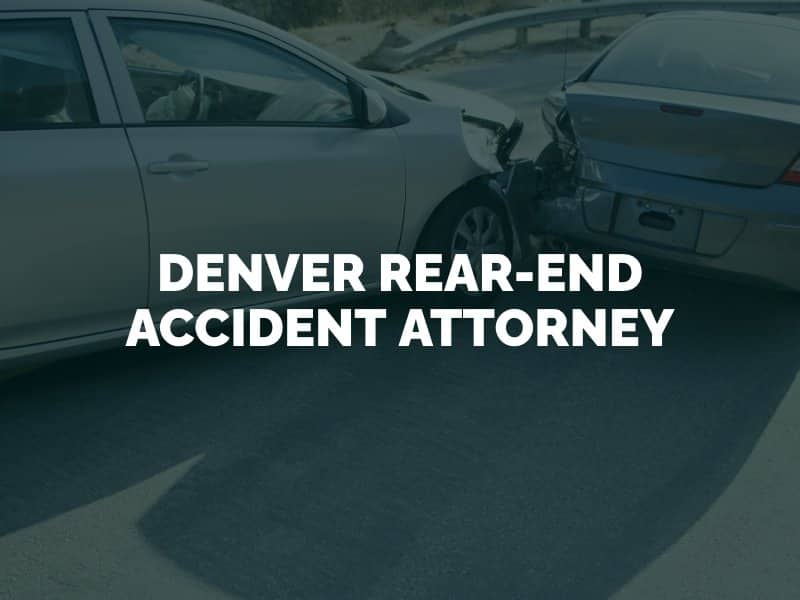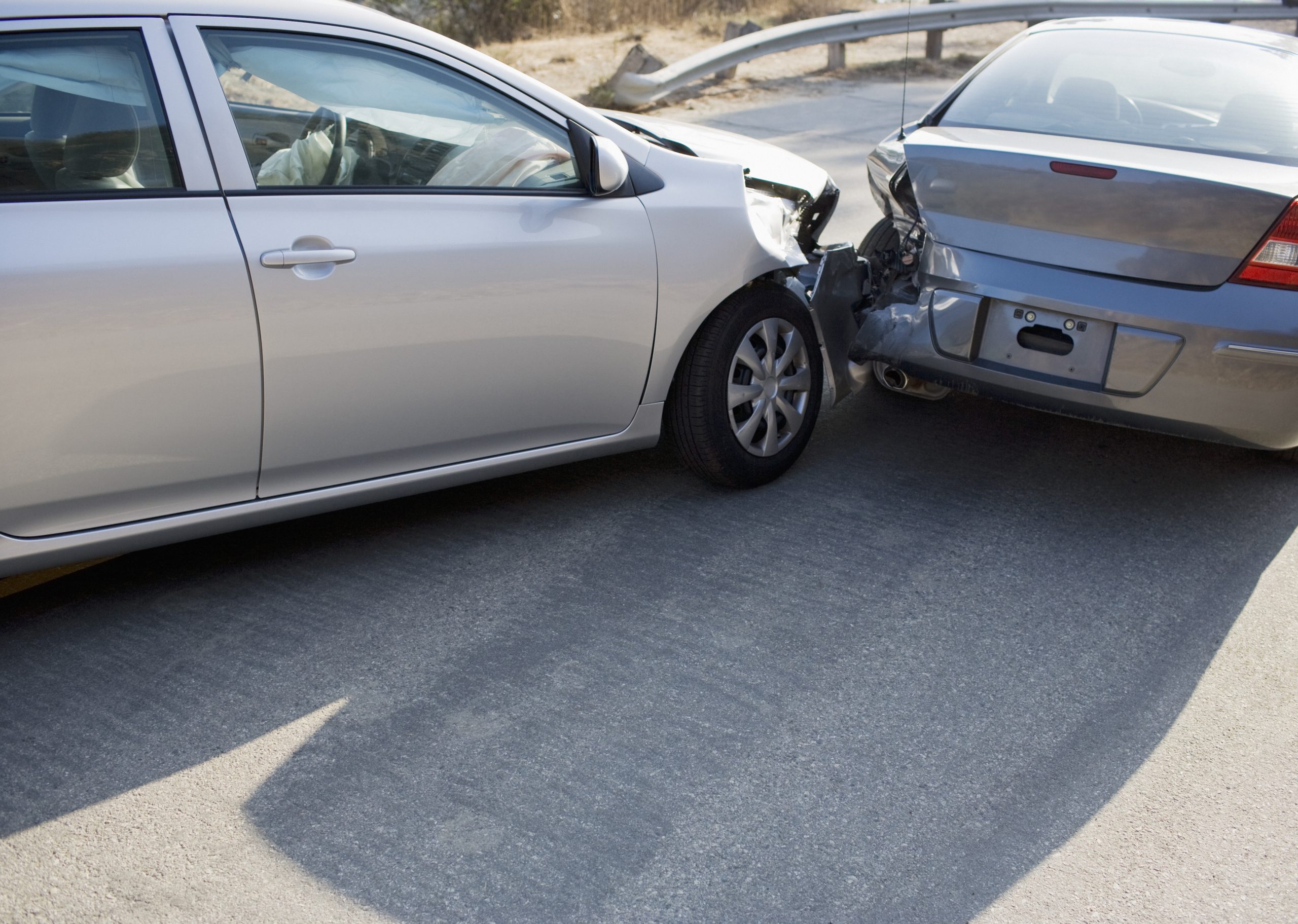In a rear-end collision, one vehicle crashes into the vehicle in front of it. Rear-end accidents can cause injuries ranging from minor to fatal. If you have been hurt in a rear-end crash caused by a negligent driver, call Fang Law Firm to schedule a consultation. Our experienced Denver rear-end accident attorneys can tell you if you have a case and what damages you may be entitled to claim.

Proving liability is not always easy after a rear-end crash. If you have been rear-ended, it is not a given that the driver who hit you was at fault for the accident. Under Colorado comparative negligence laws, the other side will attempt to assign a degree of fault for the accident to you. You may recover damages if the other party is found to have been more at fault than you were, but your recovery will be reduced by the percentage of fault you are assigned.
Our experienced Denver car accident lawyers can:
Our Denver rear-end accident attorneys can ensure you are treated fairly throughout the car insurance claims process. We can take over communications and negotiations with an insurance claims adjuster on your behalf to fight for a fair case outcome. Our rear-accident lawyers in Denver have years of experience that can help you achieve better results for your rear-end car accident case than representing yourself. We can handle legal matters for you while you focus on healing from your crash-related injuries.
Although nothing can reverse the injuries you suffered in a rear-end collision, a successful car accident case could result in damages (financial compensation) paid to help you and your family move forward and prepare for the future. You may be eligible to recover damages for various economic and noneconomic losses caused by the crash. Examples include:
In rare cases, punitive or exemplary damages may also be available in a rear-end car accident case. This is an additional award intended to punish a defendant for egregious acts of wrongdoing, such as willful or wanton actions or intent to harm. A drunk driver, for example, may be required to pay punitive damages for recklessly causing a serious rear-end collision.

Determining the average settlement amount for a rear-end car accident is a challenge since case values can vary significantly based on its unique facts. Some car accident victims receive $10,000 or less for minor damage, for instance, while others can qualify for six-figure settlements and beyond for life-changing collisions.
Factors that impact how much a rear-end collision case is worth may include injury severity, the price of resulting medical expenses, the value of vehicle damage, the insurance coverage available and liability issues such as comparative negligence. To determine the potential value of your specific case, you must consult with an attorney.
A statute of limitations is a law that imposes a time limit on a plaintiff’s ability to file a personal injury claim. Every state has unique statutes of limitations. In Colorado, the standard statute of limitations for personal injury cases, such as slip and fall accidents, is two years.
It is important to know and obey your statute of limitations as a victim of a rear-end car accident in Denver. If you miss your filing deadline, the courts will most likely refuse to hear your case. However, there are a few exceptions to the rule. If you did not discover your injuries right away, the clock will not start ticking until the date that you discovered or reasonably should have discovered them.
Another exception applies to injured victims who are under the age of majority (18 in Colorado). Accident victims who are minors have three years from the date they turn 18 to file car accident claims. Be aware that some exceptions shorten rather than extend the filing deadline, as well. A claim against a government agency, for example, must be filed within 180 days of the car accident.
The Insurance Information Institute (III) reports that in a recent year, there were 2,203 fatal rear-end accidents in the U.S. and 556,000 causing injuries. As determined in a study published by the National Highway Traffic Safety Administration (NHTSA), common causes of rear-end crashes include:
The majority of rear-end collisions in Colorado are caused by driver error. If another driver was negligent and this resulted in your collision, the at-fault driver’s insurance company may be financially responsible for your related losses. However, a third party such as a vehicle manufacturer may also be at fault, depending on the circumstances. Our Denver rear-end attorneys can investigate your crash to identify the cause and determine the responsible party/ies.
Rear-end collisions are among the most frequently occurring accidents in the U.S. They can cause a variety of injuries, ranging widely in severity, depending on the circumstances surrounding the crash. Common rear-end accident injuries include:
Even a minor injury from a rear-end collision can cause pain, medical expenses and inconvenience. Serious to catastrophic injuries can change a victim’s life forever. At Fang Law Firm, our car accident lawyers can help victims with any type of injury from a rear-end collision in Denver.
Liability, or legal and financial responsibility, is typically assigned to a driver or third party based on the legal doctrine of negligence. Negligence refers to the failure to use proper care under the circumstances, resulting in harm to other people. In a rear-end car accident, the liable party is often the driver who is found to have been negligent, such as someone who violated a traffic law. Proving liability in a rear-end collision case generally requires evidence of negligence
The plaintiff’s attorney will need to show based on a preponderance of the evidence (more likely to be true than not true) that the driver or another defendant owed the injured victim a duty of reasonable care, breached or did not meet this duty of care, and that this was the actual or proximate cause of the accident. These are the key elements of negligence. Evidence to support a rear-end collision case may include a police accident report, photos and videos, eyewitness statements, and expert testimony.
In a rear-end collision, the liable party is most often the driver of the rear vehicle. It is a following driver’s responsibility to maintain a safe distance between the front of his or her car and the back of another driver. The rear driver must pay attention to the road and apply the brakes in a reasonable manner to avoid colliding with a vehicle that has slowed down or stopped. Failing to meet the duty of care can make the rear driver liable for a subsequent collision.
However, there are scenarios where the front or leading driver can be held liable for a rear-end collision. If the leading driver swooped in front of another car when it was not safe to change lanes, for example, he or she could be held responsible for a resultant collision. Reckless driver behaviors such as intentionally brake-checking another driver could also place liability for a wreck with the leading driver.
If a rear-end collision involves more than two vehicles, liability can be more difficult to determine. In a chain-reaction car accident that involves three or more drivers, for example, an investigation may be necessary to determine who was at fault for the initial collision that triggered the chain reaction.
For instance, if Driver C was texting while driving and crashed into the back of Driver B and the force of the collision pushed Driver B into Driver A, Driver C would be held liable for damages suffered by both Driver A and Driver B. Although Driver C’s vehicle never touched Driver A’s vehicle, Driver C would be liable for causing the initial rear-end collision that led to all subsequent collisions.
If multiple drivers share responsibility for a multi-car accident, an injured victim can still recover financial compensation. Under Colorado’s comparative negligence law, the injured victim’s financial recovery would be reduced by a percentage equivalent to his or her degree of fault. A driver who is found to be 20 percent at fault for a rear-end car accident, for example, would recover compensation equal to 80 percent of the case’s total value.
If you have been injured in a rear-end accident, contact Fang Law Firm today. Our Denver rear-end accident attorneys operate on a contingency-fee basis. This means you pay us no legal fees until we win your case for you. We are dedicated to helping our clients in the best way possible.